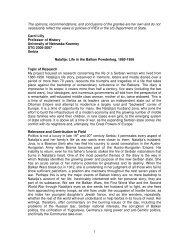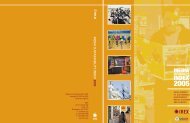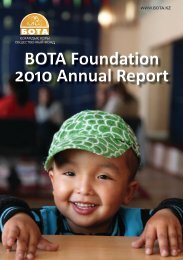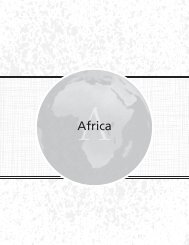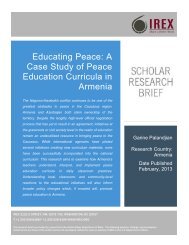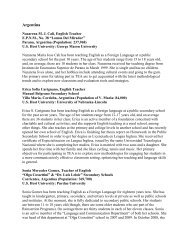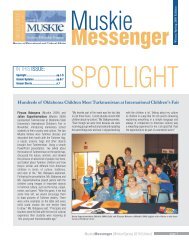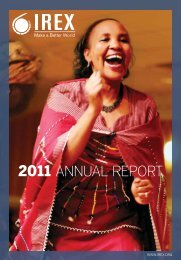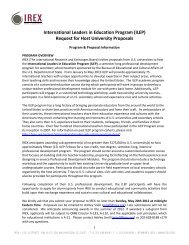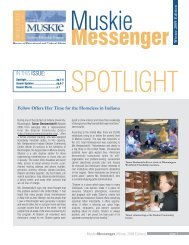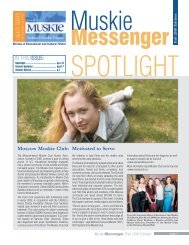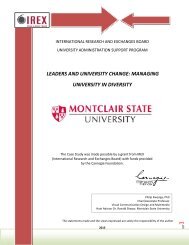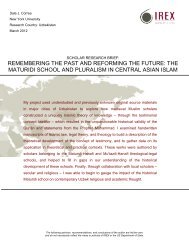IATP Monitoring and Evaluation Report - IREX
IATP Monitoring and Evaluation Report - IREX
IATP Monitoring and Evaluation Report - IREX
Create successful ePaper yourself
Turn your PDF publications into a flip-book with our unique Google optimized e-Paper software.
Living with HIV/AIDS (network.org.ua), encourages<br />
<strong>and</strong> empowers patients to stick to their treatment<br />
schedules. Many of their clients are involved with<br />
drugs or the criminal justice system, populations<br />
especially susceptible to poor adherence. The<br />
Ukrainian government provides treatment free of<br />
charge, but medicine—whatever its cost—cannot be<br />
effective if it is taken improperly or insufficiently.<br />
In response to this problem, Doroga Zhyttya applied<br />
a mobile technology-based community outreach<br />
tool developed in Africa <strong>and</strong> brought to Eurasia<br />
by <strong>IATP</strong>. With <strong>IATP</strong> support, members of the<br />
NGO created a project plan to send SMS messages<br />
to the mobile phones of a 20 client test group. To<br />
implement this operation, the NGO needed only a<br />
laptop, a cell phone <strong>and</strong> FrontlineSMS – free software<br />
available to community-focused development<br />
NGOs. Now clients receive coded messages three<br />
times each day, anonymously reminding them to<br />
take their scheduled dosage (http://<br />
iatpnews.typepad.com/iatp/2009/04/ukrainianngo-employs-sms-technology-in-battle-againsthivaids.html).<br />
Another NGO, Tamarisk, was among several local<br />
NGOs in Dnipropetrovsk, Ukraine, that launched<br />
pilot projects in cooperation with <strong>IATP</strong> using mobile<br />
phone technology to promote social change. At<br />
the beginning of 2009, <strong>IATP</strong> began conducting<br />
training for local NGOs on mobile technology <strong>and</strong><br />
the use of FrontlineSMS, open source mobile communications<br />
software developed specifically for the<br />
non-governmental sector. Tamarisk serves as an<br />
information <strong>and</strong> resource center for similar organizations<br />
in the region. It manages an online portal<br />
on citizens’ initiatives in Dnipropetrovsk, runs a<br />
media center for NGOs, <strong>and</strong> regularly organizes<br />
training sessions, roundtables, <strong>and</strong> other events for<br />
representatives of local NGOs <strong>and</strong> media outlets.<br />
FrontlineSMS is a valuable resource for organizations<br />
like Tamarisk in distributing important information<br />
to large numbers of people. After mastering<br />
the software, Tamarisk staff compiled an SMS mailing<br />
list with 50 mobile phone numbers of local NGO<br />
representatives <strong>and</strong> sent SMS updates <strong>and</strong> notifications<br />
on community events. The staff was impressed<br />
by their ability to inform dozens of people<br />
in a few minutes instead of spending half a day to<br />
contact them by phone. Tamarisk still uses e-mail<br />
to send the same information, but not all NGOs <strong>and</strong><br />
citizen activists have access to e-mail, especially in<br />
rural areas. More people have mobile phones, <strong>and</strong><br />
are more likely to read messages they receive immediately.<br />
Disseminating information using FrontlineSMS<br />
has had a positive impact on Tamarisk’s ability<br />
to reach its target audiences; at an April 2009<br />
event held at the NGO’s office, 60% of attendees<br />
heard about the event via SMS. Participants expressed<br />
their gratitude to Tamarisk for using such a<br />
convenient form of outreach, allowing them to get<br />
timely information <strong>and</strong> facilitating their participation<br />
in what was an important event for the local<br />
civil society community.<br />
Tamarisk is constantly adding new contacts to their<br />
SMS mailing list <strong>and</strong> plans to divide it into several<br />
sub-lists for NGOs working in different fields.<br />
Tamarisk President Tatyana Barashkova commented,<br />
“We started working with <strong>IATP</strong> less than a<br />
year ago. Since that time, they have introduced us<br />
to a number of new <strong>and</strong> useful technologies. First,<br />
we participated in a series of training sessions on<br />
Web 2.0 applications, <strong>and</strong> organized other NGOs to<br />
take this training at <strong>IATP</strong>. Now we learned about a<br />
new opportunity to increase the effectiveness of<br />
our work through mobile technology. We are sure<br />
that the positive impact of <strong>IATP</strong> activities on our<br />
local community will be noticeable for years after<br />
<strong>IATP</strong> is officially closed in Ukraine” (http://<br />
iatpnews.typepad.com/iatp/2009/06/local-ngos-indnipropetrovsk-use-mobile-technology-todisseminate-important-information.html).<br />
User-friendly website design: <strong>IATP</strong> helps local<br />
governments, NGOs <strong>and</strong> youth organizations design<br />
<strong>and</strong> update websites through a WYSIWYG (“what<br />
you see is what you get”) editor. This possibility<br />
unleashes the creativity <strong>and</strong> passion of local citizen<br />
activists without requiring any knowledge of Web<br />
programming. Since June 2007 646 regularlyupdated<br />
websites were created by <strong>IATP</strong> users<br />
throughout Eurasia in result of <strong>IATP</strong> web design<br />
technical training. Moreover, 49 e-government<br />
websites were created by local governments in cooperation<br />
with <strong>IATP</strong>.<br />
37



